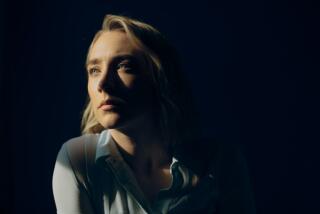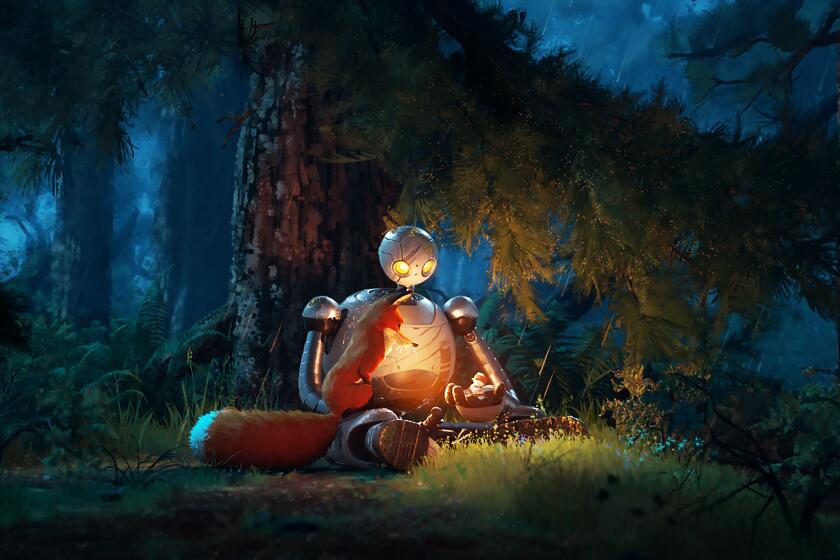Shelter From the Blockbuster Heat
With its focus on rarities and treasures from cinema’s attic, the UCLA Festival of Preservation is always a welcome treat. Usually held around Oscar time, its eighth edition begins Thursday, and that switch to Hollywood’s silly season is especially pleasing to everyone drowning in the studios’ ideas of summer fun.
The new date also puts the event roughly in sync with the fourth Film Preservation Festival on American Movie Classics, which runs June 30-July 5 and focuses on dozens of examples of the American musical.
AMC is in fact hosting the opening night of the UCLA event, which showcases a fine restoration of the Rita Hayworth-starring 1946 “Gilda,” made from the original camera negative refurbished by nitrate material from England. This was Hayworth’s most famous film, so potent that she later noted poignantly that her personal life suffered because “men fell in love with Gilda and woke up with me.”
The highlight of this year’s festival, however, will be closing night on July 20, when another 1946 film, the Howard Hawks-directed “The Big Sleep,” starring Humphrey Bogart and Lauren Bacall, will be shown in a rare alternate version that is as involving as it is unusual.
When a studio reshoots and re-edits a film, a great howl is usually heard about the virtues of the original. What is so provocative about the two cuts of “The Big Sleep,” both made with Hawks’ approval, is that most viewers would likely consider the newer one superior.
“The Big Sleep” finished shooting in January 1945, and was ready for release soon after. But since World War II was winding to a close, studio head Jack Warner decided to shelve it and give priority to films that referred to the war and would consequently date.
In the interim, Lauren Bacall’s ability to sass Bogart in “To Have and Have Not”--plus her marriage to him--made the actress a major star. As related in memos published in Rudy Behlmer’s “Inside Warner Bros.,” agent Charles K. Feldman wrote Warner suggesting Bacall’s part be beefed up to take advantage of her new celebrity. If he didn’t do this, Feldman warned, “you might lose one of your most important assets.”
Warner agreed, and in early 1946, one year after the film was finished, new material was shot and edited into “The Big Sleep,” which was finally released in August 1946. The additions include two of the best-remembered scenes in the movie, including the classic encounter when Bogart and Bacall discuss each other’s romantic potential in horse-racing terminology. (According to Todd McCarthy, whose authoritative biography of Hawks will be published early next year, the swell new scenes were written by Philip G. Epstein, best known for partnering with his brother Julius on “Casablanca.”)
To make room for the changed scenes, which totaled 18 minutes, a comparable amount of footage had to be cut, including a key exposition scene in the Los Angeles district attorney’s office that recaps who killed whom up to that point. So, paradoxically, the very things that make “The Big Sleep” so perennially popular also helped create its reputation as a film with a borderline incomprehensible plot.
The festival will screen the initial 1945 version in full, and then UCLA preservation officer Robert Gitt will introduce the scenes from the 1946 version that were added as well as those from the 1945 version that were cut out, plus the original theatrical trailer and two short sets of outtakes.
Organized by the UCLA Film and Television Archive, the Preservation Festival pays tribute this year to one of its counterparts on the East Coast, the George Eastman House in Rochester, N.Y., which has especially strong holdings in silent films.
These include a double bill of 1928 German silents with Robert Israel musical accompaniment. “I Kiss Your Hand, Madam” is considered one of Marlene Dietrich’s best, and “The Wonderful Lie of Nina Petrowna” is a chance to see the striking Brigitte Helm and co-star Franz Lederer outside their legendary roles in “Metropolis.”
Helm, who died only two weeks ago at the age of 90, was considered the most beautiful woman in German film and in fact was Josef von Sternberg’s first choice, before Dietrich, for the career-making “Blue Angel.”
Set in czarist Russia and drenched in both opulent furnishings and continental sophistication, “Nina Petrowna” stars Helm as a kept woman with a gorgeous mansion to prove it. But jaded roues are no match for an impoverished lieutenant, “an unspoiled son of the people,” who falls in love with her. With a classic face and a sensual, tousle-haired presence, Helm looks terrific in the film’s elaborate costumes and furs.
Considerably more innocent in tone is the 1926 Herbert Brenon version of J.M. Barrie’s “Peter Pan,” starring a perky Betty Bronson in (what else but) a Peter Pan collar as the boy who refuses to grow up. Headed for this year’s Pordenone silent film festival, “Peter Pan” has a delicate, childlike sensibility, charming special effects, a fine Captain Hook in Ernest Torrence and even an early appearance by Anna May Wong as Tiger Lily.
Sharing a double bill with “Peter Pan” is “Lonesome,” a 1928 Paul Fejos film that was the delight of both Telluride and Pordenone two years ago. A naturalistic Manhattan love story about a machinist and a telephone operator who find each other during a raucous day at Coney Island, it will be shown in a version to which brief talking sequences were added. The immediate contrast between sound and silence is a rare opportunity to see and understand firsthand why the coming of talkies upset as many people as it did.
Perhaps the most anticipated silent is Henry King’s 1925 adaptation of George Eliot’s “Romola,” a costume drama set in 15th century Florence and starring Lillian and Dorothy Gish, William Powell and Ronald Colman. The Stanford Theater Foundation not only sponsored the film’s restoration, it commissioned a new organ score from Dennis James and was instrumental in securing the L.A. County Museum’s Bing Theater, which has the equipment to project the film at its correct speed of 18-20 frames per second, for the screening.
Aside from “Romola,” the only program not held at UCLA’s Melnitz Auditorium is “Four Presidents on Television,” featuring footage of Harry Truman, Dwight Eisenhower, Richard Nixon (in his celebrated debate with Nikita Khrushchev) and John F. Kennedy, which will be shown at the Academy of Television Arts & Sciences.
Some of the festival’s most memorable films are little-seen sound movies that illuminate unexpected corners of film history, such as 1944’s wacky “Song of the Open Road,” which features 15-year-old Jane Powell as a Hollywood version of herself, a lively teenage movie star who flees show business to hang out with a well-scrubbed bunch of young bicyclers who work as volunteer crop pickers. An opening musical number, with lines like “as we go rolling down the road, life is heaven a la mode,” verges on the astonishing.
The same can be said for a much darker film, 1945’s “The Strange Affair of Uncle Harry,” directed by the brooding Robert Siodmak, which stars Geraldine Fitzgerald as a sister whose love for older brother George Sanders is as close to incestuous as the Production Code would allow, if not closer.
Playing with “Uncle Harry” is the equally unnerving “Specter of the Rose,” a 1940s version of American independent cinema co-directed by writer-producer Ben Hecht and cinematographer Lee Garmes. Best described as a hard-boiled ballet movie (“Terror in Tutus” might have been a good title), it explores the relationship between a mad, possibly homicidal dancer and the ballerina who loves him. Watch for Lionel Stander as a crude but sensitive poet who says, “My heart performs a minuet in an ashcan” and “Your grief sharpens its claws on my heart.”
Also co-written and co-directed by Hecht (this time with Charles MacArthur) is 1935’s memorable “The Scoundrel,” starring Noel Coward in a sharp performance as an autocratic, heartless publisher who has martinis for breakfast and impressionable young women for lunch and dinner. With its witty dialogue and outrageous situations, “The Soundrel” is strange, compelling, one of a kind. Just the kind of film that makes the Festival of Preservation the most exciting event of this city’s movie year.
(BEGIN TEXT OF INFOBOX / INFOGRAPHIC)
UCLA Festival of Preservation
All screenings are at UCLA’s Melnitz Theater at 7:30 p.m., unless otherwise noted.
June 27: “Gilda.”
June 28: “Design for Living,” “The Scoundrel.”
June 29: “Fear and Desire,” “The Unholy Three.”
June 30: “Romola” (Los Angeles County Museam of Art), 7 p.m.
July 5: “Hoop-La,” “Northwest Mounted Police.”
July 6: “Monte Carlo,” “The Love Parade.”
July 7: “If I Were King,” “The Bridge of San Luis Rey,” 7 p.m.
July 10: “Four Presidents on Television” (Academy of Television Arts and Sciences).
July 11: “Song of the Open Road,” “One Touch of Venus.”
July 12: “Peter Pan,” “Lonesome.”
July 13: “Speedy,” “Ladies’ Night in a Turkish Bath.”
July 14: “Sherlock Holmes and the Secret Weapon,” “The Scarlet Claw,” 2 p.m.; “The First Year,” “Tess of the Storm Country,” 7 p.m.
July 17: “The 1930s: Prelude to War,” Hearst Metrotone newsreels.
July 18: “I Kiss Your Hand, Madame,” “The Wonderful Lie of Nina Petrowna.”
July 19: “The Strange Affair of Uncle Harry,” “Specter of the Rose.”
July 20: “The Big Sleep.”
UCLA’s Melnitz Theater is on the northeast corner of the Westwood campus, near the intersection of Sunset Boulevard and Hilgard Avenue. Tickets are $4-$6. Parking is available for $5. Information: (310) 206-FILM.
The Los Angeles County Museam of Art’s Bing Theater is at 5905 Wilshire Blvd. Parking is available across the street. Tickets for “Romola” are $4-$6 and are available at the LACMA box office, which opens at 11 a.m. on the day of the screening. Information: (213) 857-6010.
The Academy of Television Arts and Sciences’ Academy Plaza Theater is at 5230 Lankershim Blvd., North Hollywood. Admission to “Four Presidents on Television” is free, but you must reserve seats at (310) 206-8014. Parking is available for $2.
More to Read
Only good movies
Get the Indie Focus newsletter, Mark Olsen's weekly guide to the world of cinema.
You may occasionally receive promotional content from the Los Angeles Times.











